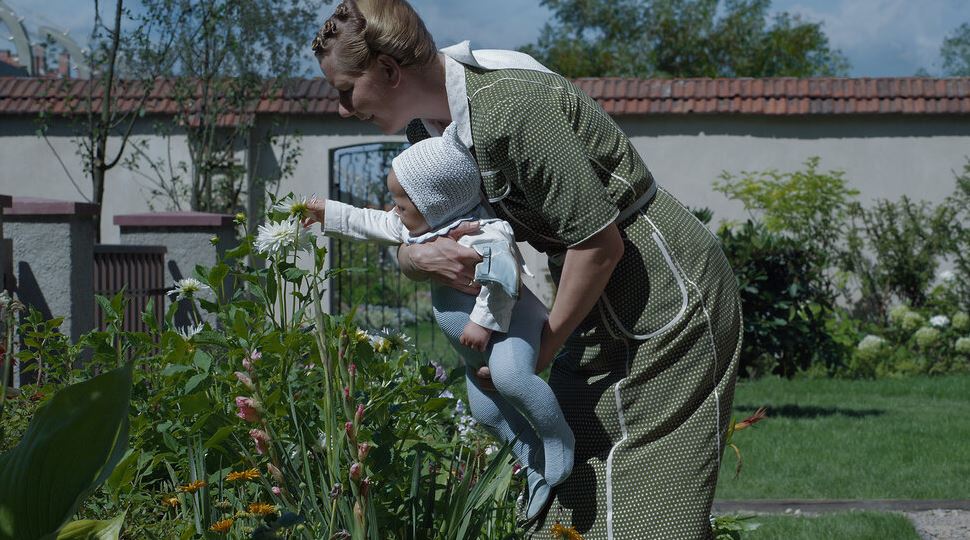| Worth seeing: | as an examination of the banality of evil, with the architects of the Holocaust going about their daily lives as if the screams of dying Jews next door are nothing more than the sound of the wind |

| Director: | Jonathan Glazer |
| Featuring: | Christian Friedel, Sandra Hüller, Daniel Holzberg, Freya Kreutzkam, Imogen Kogge, Johann Karthaus, Max Beck, Ralf Zillmann, Ralph Herforth |
| Length: | 105 minutes |
| Certificate: | 12A |
| Country: | Poland, UK, US |
| Released: | 2nd February 2024 |
WHAT’S IT ABOUT?
Rudolf Höss (Christian Friedel) has an idyllic lifestyle in the comfortable countryside home he shares with his wife Hedwig (Sandra Hüller) and their five children.
He works next door and spends his spare time swimming, boating and fishing in the river with his family.
But when his bosses move his job hundreds of miles away, it causes tension with Hedwig, who insists that she and the children stay in their house. His bosses agree.
Rudolf is later reassigned to his original base for a new project, reuniting the family.
Oh – his original base? The Nazis’ Auschwitz concentration camp – that Rudolf Höss himself founded, designed and improved to increase its killing capacity.
WHAT’S IT LIKE?
British director Jonathan Glazer doesn’t make films often, but when he does, he ensures that people stand up and take notice and his latest is certainly an interesting take on a perennial theme.
The same horrors of the Holocaust, seen on film for decades aren’t seen at all this time – not directly, anyway – but they’re heard; screams from over the garden wall – gunshots – and smoke is seen rising from the crematoria. It’s constant, but life just goes on as normal – for the Höss family – as lives end in their thousands on the other side of the wall. To the viewers, it’s the sound of genocide – to the characters, it has no more effect than the sound of a summer breeze.
It’s the sheer banality of evil that’s so shocking here – that anyone can just carry on as normal, with history’s greatest horrors taking place next door, with the family’s blessing. With thousands of Jews being abused and murdered within earshot, the only worry Hedwig has in the world is that she might have to move away from her dream home.
So proud is Hedwig, as she shows friends around their beautifully tended garden, that she describes herself as the Queen of Auschwitz. Only very occasionally to we meet a visitor who can’t quite face the situation.
And it’s the matter-of-fact coldness with which Höss himself discusses the details of a new gas chamber that makes it clear how the Nazis truly believed in what they were doing.
This film, set in the eponymous “zone of interest” around Auschwitz, generates a thoroughly chilling mood but is less interested in telling a story. It’s more about how the characters are completely unmoved by the horrors around them than it is about what they actually do. Höss is really the only one who does anything – everyone else is just existing in this chilling space – without feeling any chills at all.
Glazer’s film is based on the novel of the same name by Martin Amis, who died before the film was completed. But the adaptation is very loose – so loose that most of the plot is stripped out, leaving little enough of the original story to make you wonder why they bothered keeping the title.
In a vacuum, the film’s nihilism would have painted an arresting picture that would have stopped viewers in their tracks, but it has added emotional heft, being released at a time when the very consequences of the Holocaust are being cited by supporters of both sides of what’s currently happening in the Middle East – either being used to justify Israel’s right to defend itself from another group of people trying to do to the Jews what the Nazis failed to complete or to ask how a people who were saved from such brutality can now inflict suffering on others.
But in a vacuum, the film might have changed minds and made people reassess their views, but being descriptive, rather than prescriptive, while it will remind viewers of the true meaning of the word “genocide,” which is currently being bandied about at the Hague and elsewhere, The Zone of Interest, will be used by each side to justify their pre-existing beliefs and it’s unlikely to change anyone’s views at all.
That is perhaps the most frightening conclusion – that film-goers might watch this depiction of some of the leading characters in history’s most famous genocide – yet it won’t change their views on the world we live in now.
